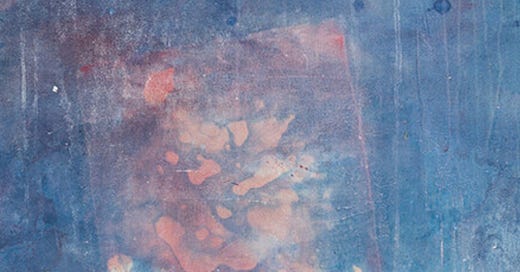That kind of joy that only ever grows
This Friday, my friends and I took the train journey from London’s King’s Cross to Cambridge for the day. It was and it wasn’t a reunion – these three friends and I see each other at least fortnightly – but it’s nearly ten years since we graduated, and a long time since we’ve all been back in college together.
Cambridge is a beautiful city, and St John’s, where the four of us studied and lived, where we first met as teenagers nearly thirteen years ago now, is an especially beautiful college. It is golden walled and cloistered, in summer it is sun-drenched with ivy across its back face and rooms that look out over the river, the Cam, which runs straight through the centre of the college. It was, in short, a magical – albeit complicated – place to spend three years.
In many ways, things have changed. Student encampments protesting the genocide in Gaza and the university’s deep financial entanglement with fossil fuel companies sit on King’s Parade: the students, by all accounts, are more serious. We gossiped with the college Porters, who told us that this new generation drink less now, they go out less, they are worried about the state of the world and their own place in. The truth is that when we were undergraduates, the majority of our friendship group was too preoccupied with the college’s internal dramas and with the pressure of essay deadlines to engage meaningfully in global politics. Things are different now, young people are more engaged with the injustices of the world, more likely to protest them, more likely to be vocal about them.
Visiting Cambridge after all this time, particularly with these three women whose love and friendship has sustained me through some of the hardest periods of my life, and whose joy has always been my infinite joy, was so precious. We sat on the backs watching the exam finishers gather in anxious circles, watched their body language, nervous flirtations. Some of the more grotesquely monied traditions hadn’t changed: still, students spray each other with Cava when they came out of their exams, one or two got egged, and we watched, now completely shameless in our fascination, as they jumped one by one off Kitchen Bridge into the Cam to wash themselves clean. We watched as three half-dressed, river-sodden finalists tried to sneak off across the backs, half-chased, half-watched by the college Porters, and speculated whether they would end up with E.coli for May Week, whether the UK’s now sewage-ridden rivers would be the things that drove the final nail in the coffin of Sunak’s Conservative Party in the coming General Election.
I felt – and I know my friends felt this too – calm, expansive. In part, I think it had to do with the beauty of the place, with the memories of naivety and aspiration it held. We might not have been so politically active as these undergraduates (perhaps not the ones in the river, but you never know) now were, but we were possessed of that strange and fragile power that comes with youth, I think particularly if you are privileged enough to have a good education. This is the power that comes with the belief – however misguided – that you can actually change things.
My three friends all work in either the public or third sector, all of us intimately acquainted with the blockages and budgetary constraints and administrative black holes that seem to come between your intention to enact change, and actually having any kind of impact. Such youthful hopes inevitably begin to dull as you enter into the world of work and administration, and all of us have struggled in our ways with that frustration, and how much simpler we had once thought life might turn out to be.
But we went for dinner in hall and we sat in the bar together gossiping, and it felt as though no time had passed since we were undergraduates ourselves, filled with that old naivety. Except something has changed, we know now what we didn’t know then: the value of that hope, and, most importantly, the value of the bond we have between us. Everybody has bonds like this in some form or another. Those friendships that are so old and familiar that in fact, very often, there is no need to talk about the important things. Between us, the biggest life updates are usually footnotes to conversations about seemingly much smaller things.
But this is the quality of such friendships and relationships, which I really think are the most precious substance of life. We’ll celebrate one another’s achievements, of course. But we don’t really mind about all of that: we don’t really mind where each of us is going, what adventures lie ahead. We only mind that all of us get to be here right now. Our aspirations might change, our life’s paths might change, and maybe some of that hope might dull and shrink. But this joy we share in one another’s presence, it only ever seems to grow.



